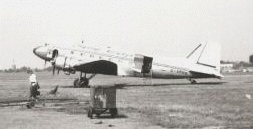The crew of the plane were flying enthusiasts. The Captain - a Belgian aristocrat
by birth, although he never made mention of the fact or pulled 'rank' - had flown
the route over 90 times previously. He learned to fly in 1950 and had over 7000 hours
flying time in his log book, 600 as pilot in command on Dakotas. Everyone who
flew with the Captain will testify to his charm, generosity, courtesy and professional
approach. He left his mark on many colleagues and was a devoted family man. Even
today, many years later, those who knew him speak of him with deep affection and
as someone special.
The First Officer was new to the Airline, but an experienced RAF Transport Command
pilot with over 4000 hours. Living in Southend on Sea, the home of Channel Airways
he was a motor sport enthusiast, had tried a career in accountancy after leaving
the Services, but flying was in his blood and when a chance came to join Channel,
he took it.
Both pilots had young families and a very steady, professional approach to flying
passenger aircraft. They were fully qualified to fly the plane in all conditions
and massively experienced in the aviation industry. They were neither inexperienced
nor reckless as one newspaper claimed. One journalist, presumably looking for a sensation
and regardless of the distress caused, tried to imply that there had been a 'race'
between two planes of the same airline. The other aircraft, a de Haviland 'Dove'
was scheduled for the same destination and took off shortly before the Dakota. This
was carrying passengers while Zulu Bravo had passengers and freight; overspill from
the delays caused by fog, and Channel Islands daffodils and irises destined for Covent
Garden Market. Who went on which aircraft was a matter for fate to decide.
The stewardess learned French at night school so that she could get a job with the
airline. All three were respected and well liked by colleagues. They come over as
being a thoroughly nice, reliable and professional crew who would do all they could
to help their passengers, but would not break safety rules - as was shown on the
outward flight, details of which will follow.
Like something from a Greek tragedy, none should have been flying that day. Due
to the delays that had built up because all flights had been grounded by the dreadful
weather, all three had been called in at the last moment to operate an additional
service in an attempt to return stranded passengers as soon as there was any chance
of flying. The Pilot and Stewardess were on standby, and looking forward to a day
off.
The Stewardess didn’t really want to fly that day - she was about to be married in
Paris and had lots to do for the wedding.
The Co-pilot was scheduled to fly on a 'Viking' but was swapped at the last moment
to the Channel Islands run. In each case the telephone call from the Airline would
spell disaster and shatter the lives of their families. However, there may already
have been a 'mind set' in place - an extra flight, stand by-duty and stranded passengers
needing to get home.
Perhaps the beginnings of the tragedy were in place even before the phone rang.


